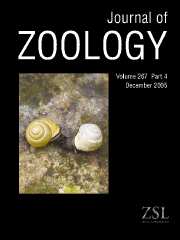Crossref Citations
This article has been cited by the following publications. This list is generated based on data provided by
Crossref.
MacLaughlin, K.
Ostro, L.E.T.
Koontz, C.
and
Koontz, F.
2000.
The ontogeny of nursing inBabyrousa babyrussaand a comparison with domestic pigs.
Zoo Biology,
Vol. 19,
Issue. 4,
p.
253.
Roulin, Alexandre
2002.
Why do lactating females nurse alien offspring? A review of hypotheses and empirical evidence.
Animal Behaviour,
Vol. 63,
Issue. 2,
p.
201.
Berger, Eva M.
Leus, Kristin
Vercammen, Paul
and
Schwarzenberger, Franz
2006.
Faecal steroid metabolites for non-invasive assessment of reproduction in common warthogs (Phacochoerus africanus), red river hogs (Potamochoerus porcus) and babirusa (Babyrousa babyrussa).
Animal Reproduction Science,
Vol. 91,
Issue. 1-2,
p.
155.
Baldovino, M. Celia
and
Di Bitetti, Mario S.
2007.
Allonursing in Tufted Capuchin Monkeys (Cebus nigritus): Milk or Pacifier?.
Folia Primatologica,
Vol. 79,
Issue. 2,
p.
79.
White, Angela M.
and
Cameron, Elissa Z.
2009.
Communal nesting is unrelated to burrow availability in the common warthog.
Animal Behaviour,
Vol. 77,
Issue. 1,
p.
87.
Hoogland, John L.
2009.
Nursing of own and foster offspring by Utah prairie dogs (Cynomys parvidens).
Behavioral Ecology and Sociobiology,
Vol. 63,
Issue. 11,
p.
1621.
White, Angela M.
2010.
A pigheaded compromise: do competition and predation explain variation in warthog group size?.
Behavioral Ecology,
Vol. 21,
Issue. 3,
p.
485.
White, A. M.
and
Cameron, E. Z.
2011.
Fitness consequences of maternal rearing strategies in warthogs: influence of group size and composition.
Journal of Zoology,
Vol. 285,
Issue. 2,
p.
77.
Pluháček, Jan
Bartošová, Jitka
and
Bartoš, Luděk
2011.
A case of adoption and allonursing in captive plains zebra (Equus burchellii).
Behavioural Processes,
Vol. 86,
Issue. 2,
p.
174.
White, Angela M.
and
Cameron, Elissa Z.
2011.
Evidence of helping behavior in a free-ranging population of communally breeding warthogs.
Journal of Ethology,
Vol. 29,
Issue. 3,
p.
419.
Olléová, M.
Pluháček, J.
King, S. R. B.
and
Hayssen, Virginia
2012.
Effect of social system on allosuckling and adoption in zebras.
Journal of Zoology,
Vol. 288,
Issue. 2,
p.
127.
Nuñez, Cassandra M. V.
Adelman, James S.
and
Rubenstein, Daniel I.
2013.
A Free-Ranging, Feral MareEquus caballusAffords Similar Maternal Care to Her Genetic and Adopted Offspring.
The American Naturalist,
Vol. 182,
Issue. 5,
p.
674.
Šilerová, Jitka
Špinka, Marek
and
Neuhauserová, Kristýna
2013.
Nursing behaviour in lactating sows kept in isolation, in acoustic and visual contact.
Applied Animal Behaviour Science,
Vol. 143,
Issue. 1,
p.
40.
Engelhardt, Sacha C.
Weladji, Robert B.
Holand, Øystein
Røed, Knut H.
Nieminen, Mauri
and
Ebensperger, L.
2015.
Evidence of Reciprocal Allonursing in Reindeer, Rangifer tarandus.
Ethology,
Vol. 121,
Issue. 3,
p.
245.
Gloneková, Markéta
Brandlová, Karolína
and
Pluháček, Jan
2016.
Stealing milk by young and reciprocal mothers: high incidence of allonursing in giraffes, Giraffa camelopardalis.
Animal Behaviour,
Vol. 113,
Issue. ,
p.
113.
Scornavacca, Davide
Cotza, Antonella
Lovari, Sandro
and
Ferretti, Francesco
2018.
Suckling behaviour and allonursing in the Apennine chamois.
Ethology Ecology & Evolution,
Vol. 30,
Issue. 5,
p.
385.
Fattorini, Niccolò
Brunetti, Claudia
Baruzzi, Carolina
Chiatante, Gianpasquale
Lovari, Sandro
and
Ferretti, Francesco
2019.
Temporal variation in foraging activity and grouping patterns in a mountain-dwelling herbivore: Environmental and endogenous drivers.
Behavioural Processes,
Vol. 167,
Issue. ,
p.
103909.
Gloneková, Markéta
Brandlová, Karolína
and
Pluháček, Jan
2021.
Further behavioural parameters support reciprocity and milk theft as explanations for giraffe allonursing.
Scientific Reports,
Vol. 11,
Issue. 1,
Skok, Janko
2022.
Suckling strategies in terrestrial ungulates (Artiodactyla, Perissodactyla) and the factors influencing them: the offspring perspective.
CABI Reviews,


